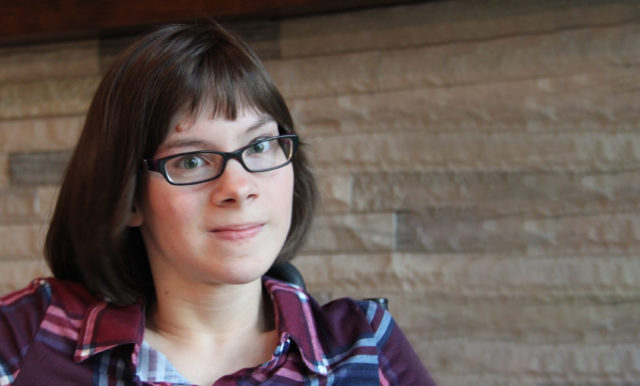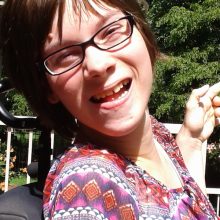[Editor’s Note: God made us relational beings, to live interconnected lives. But we don’t always do that well. We want to explore how our faith shapes the way we love the people God gives us. Join us as we consider what Jesus has to say about #relationships.]
Some people say I have beautiful green eyes. Many love my bob-cut auburn hair. They also say I have a nice smile. All of my family members wear glasses, so I have glasses too. But I also have a physical disability called Cerebral Palsy that confines me to a power wheelchair.
This means I have involuntary movements I can’t control. You may see my legs stiffen out or pull up towards my body. My arms might move in an upward motion without warning. I have to be extra careful if someone is standing too close to me because they may accidentally get hit! Sometimes, I have a feeling that my legs or arms are stuck in a certain position for a second or so before I can put them back. My left side is my good side, making it much easier to control my muscles. So I use my left hand to drive my power chair, and it’s the same hand that I use for my computer. My speech has also been affected from birth. I can talk, but it may be difficult for people who aren’t around me all the time to understand.
But I don’t mind talking about myself. In fact, I believe asking questions is okay. I can’t stand it when people just stare at me. It makes me feel like I’m a “stranger in a strange land.’’ Maybe that’s why I love children so much: they ask innocent questions. True, some are hesitant, but most children are willing to just ask. For instance, I had the opportunity to speak to different classes at my former school about living with Cerebral Palsy. The grade 2 and 3 questions were easy to answer. They would ask, “What’s your favourite colour?” or “What’s your favourite meal?” As I spoke to older students, they asked questions that made me think more. Such as, “Are you in pain all the time?” Usually, the answer is “No.”
I really don’t mind educating people about my disability. In fact, I believe it’s good for people to practise interacting with others who are different. And it always feels good to answer questions. I wish that adults would feel free to just ask.
Although people have to be comfortable with asking me questions themselves, I’m learning that I have to meet them halfway. I know I should use my communication device more often to let people get used to its robotic voice. Even though God is healing my speech a little every day, I know I still need to ask somebody to set my device up. And I need to actually engage in the conversation! However, my fears of people’s impatience can get in the way of having a real conversation. But I’ve learned that most people are pretty flexible, and sometimes they are even eager to learn how my communication device works.
I love it when people decide to talk directly to me instead of talking to whomever I’m with. It makes me feel normal and accepted. I can understand everything that people say, so when they do not look at me when asking a question, it makes me feel invisible. I do understand why people are more comfortable asking the able-bodied adult with me, but I am also an adult who wants to have a conversation of my own. A strategy that makes it easier for me is when people ask yes or no questions. Or, if needed, I spell out the words. For instance, my S’s and L’s are difficult to understand. So if I tell someone I love them, and they don’t understand, I spell it out: L O V E. I don’t mind if my helper needs to help, but it’s best if people look at and engage with me first.
Keep in mind that people with disabilities are usually uncomfortable around new people too, and are nervous when trying to communicate. But I try to remember what Jesus said about treating people how you want them to treat you (Luke 6:3): I know that if I don’t want people’s pity, I have to prove to them that I can hold a conversation.
I wish that people would see me as a person first, and then my disability. You may be surprised, but I have the same feelings, hopes, and dreams as any other young woman. True, I may have to express them differently, but my feelings are real and still there. I’m different on the outside, but God sees me on the inside, including all these desires. I try not to judge people for what they look like on the outside. After all, I have to obey God’s command too: “Judge not, that you be not judged’’ (Matthew 7:1).
I wish that people would see me as a person first, and then my disability. You may be surprised, but I have the same feelings, hopes, and dreams as any other young woman.
If you were to see who I am on the inside, you would notice that I’m the same as anyone else. I like to laugh. I like to have solitude; however, I like to be with people too. I also love to read, especially any Christian romance novels. I love to dream. To be honest, I like to dream about getting a date or even getting married. I guess God created a romantic bone in my body! Usually, I like to think of myself as a happy, easy-going person. Also, I try to be sensitive to people’s needs.
If you were to see me how God sees me, you would notice that he sees me as his child. It’s amazing to me that he looks past my disability and into my heart. Even though I may not deserve it, he still shows me his blessings. I’m a child of the King!

"*" indicates required fields





